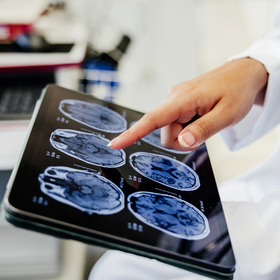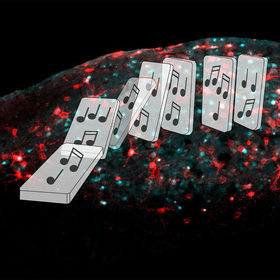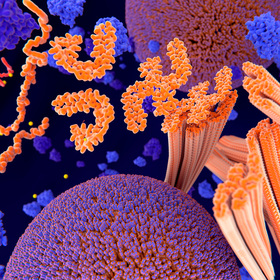News & Social Media
News
Adult survivors of childhood cancer at higher risk for meningiomas
Certain chemotherapies are associated with an increased long-term risk of subsequent tumors in survivors of childhood cancer, according to a study led by researchers at UT Southwestern Medical Center.
Birds’ songs may help unlock brain patterns behind speech
Like falling dominoes, a sequence of activity in an area of the zebra finch brain plays to completion once initiated, allowing these birds to produce their full courtship song, a study led by UT Southwestern Medical Center researchers shows.
Changes in circadian rhythms linked to higher dementia risk
Disruptions in patterns of daily activity and rest may provide early clues to heightened dementia risk, a study co-led by a UT Southwestern Medical Center scientist found.
UTSW researchers boost the power of CAR T cells to fight cancer
UT Southwestern Medical Center researchers have discovered that increasing the levels of a protein called BACH2 makes engineered cancer-fighting immune cells behave more like stem cells, improving their therapeutic effectiveness.
UT Southwestern to open DFW’s first state behavioral health hospital this summer
UT Southwestern Medical Center has been selected to operate the new Texas Behavioral Health Center – the first state acute care behavioral health hospital in the Dallas-Fort Worth area – announcing plans to care for its first patients this summer.
Modified tau thwarts aggregation in neurodegenerative disease
A designer version of the tau protein, developed by a team led by UT Southwestern Medical Center researchers, maintains its biological function while resisting aggregation, a pathological trait linked to neurodegenerative diseases called tauopathies.
State’s investment in cancer research has helped draw top talent to UTSW
Early in his career, Ralf Kittler, Ph.D., attracted the attention of academic leaders at UT Southwestern Medical Center with his studies of DNA transcription factors and their role in tumor growth and suppression.
UT Southwestern biochemist to receive O’Donnell Award from TAMEST
Yunsun Nam, Ph.D., Professor of Biochemistry and Biophysics at UT Southwestern Medical Center, will receive the 2026 Edith and Peter O’Donnell Award in Biological Sciences from the Texas Academy of Medicine, Engineering, Science & Technology (TAMEST) for her research into how RNAs and proteins interact at the molecular level. Her work has shed light on gene regulation, cancer biology, and RNA-based therapeutics.
UTSW Research: Exploring essential tremor, GLP-1RAs, and more
Essential tremor (ET) is a common movement disorder affecting about 2% of the American population, and more than 20% of those over 90 years old. Despite its prevalence and decades of study, researchers don’t know the precise mechanisms underlying ET.
Metabolic hormone found to boost resilience against flu symptoms
A hormone known for regulating energy balance also helps the body cope with influenza by triggering protective responses in the brain, a study led by UT Southwestern Medical Center researchers shows.










